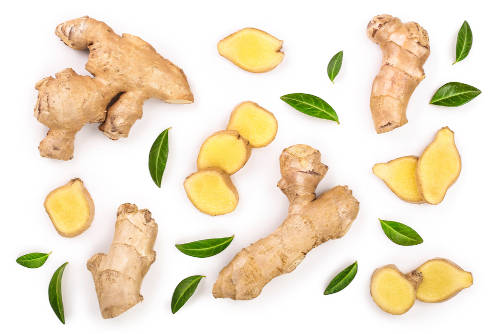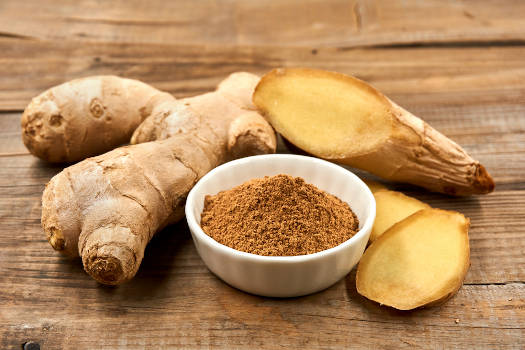Ginger (Zingiber officinale) is an unmistakable member of the spice family. These beige roots with their many knobs are mainstays of most grocery stores, whether fresh and whole, pickled, candied, or dried and ground into powder.
Long used as a medicinal plant and culinary preservative, it’s also gained a magical reputation.
Magical Properties of Ginger
Ginger is often used as a magical catalyst. The word “catalyst” is often used in chemistry, and refers to a substance that helps speed up a reaction.
Magically, catalysts do the same thing — they add speed and power to spells, and make results come sooner. While it’s a hot herb, it’s more often used for adding speed to things like love spells than for banishing or hexing.
In some traditions, ginger is a money herb. Growing it in a pot is said to draw prosperity to a home. Some people like to sprinkle a bit of dried, powdered ginger on a dollar bill, and keep this in their wallet.
As long as the ginger powder is kept fresh and the bill is never spent, it acts as a magnet for more money.
When burned as incense, ginger can be used to empower magical tools. It’s also sometimes used to break hexes.
Ginger is ruled by the Sun and the element of fire.
Benefits & Uses of Ginger
Ginger is an absolutely magnificent herb for nausea. Chewing some crystallized ginger or sipping ginger tea helps combat an upset stomach.
Research has shown that it makes for an excellent remedy for pregnancy-related nausea, with minimal side effects.
Another study found that ginger extract may be an effective treatment for fungal infections. One study compared ginger to 29 other herbs, and found it to be the most powerful antifungal in the group.
Ginger can also relieve pain. When used topically, gingerol (one of the “hot” compounds in ginger) acts as a counter-irritant. This means that they “use up” pain-signalling chemicals in the body, allowing for some temporary pain relief.

When taken internally, research has also shown that ginger is as effective as ibuprofen at relieving menstrual cramps. In India, ginger paste is applied to the temples to relieve headaches.
Other studies show that ginger also helps reduce blood sugar and improves blood lipids. It was able to reduce low density lipoproteins (LDL, or “bad” cholesterol) and raise high density lipoproteins (HDL, or “good” cholesterol) in the blood of study participants.
Studies in Japan using animal subjects found that ginger helped suppress coughs comparable to codeine, a prescription medication.
Ginger contains anti-inflammatory compounds. It can help relieve pain from exercise-induced muscle strain, and arthritis.
In traditional and folk medicine, ginger is used to induce sweating and increase circulation. It’s believed to help the body remove toxins and sickness. In the Congo, a preparation of ginger and mango sap is used as a multi-purpose medicine.
Possible Risks & Side Effects of Ginger
It’s possible to have an allergy to ginger. If you do, you may notice rashes, itching of your mouth, tongue, or throat, or anaphylaxis when you use it. If you’re allergic, please substitute another herb instead. Cloves are another spicy magical catalyst that may be suitable for your spellwork.
Since ginger has been shown to lower blood sugar, please be careful if you are diabetic or hypoglycemic. If you choose to take this herb internally in supplement amounts, talk to your doctor. You may need additional blood tests or medication adjustments in order to use ginger safely.
While many studies indicate that ginger is safe for use during pregnancy, talk to your doctor before using it to combat morning sickness. You may have to avoid ginger close to your delivery date, as it can potentially increase the risk of excessive bleeding.
Since ginger can potentially slow blood clotting, stop using it two weeks before undergoing surgery. If you are taking clotting medications or blood thinners, ginger may interact with them.
For most people, ginger is safe when used in the amounts you’d use to season food or drinks. Health risks associated with ginger generally begin to occur with large amounts of ginger, like what you’d take as an herbal supplement.
Ginger History & Folklore
Ginger was first known in China. From there, it spread to India, the rest of Asia, and Africa. When the Roman empire traded with India, ginger made its way to Europe.
It wasn’t particularly popular there at the time — after Rome fell, ginger fell into obscurity until Marco Polo re-introduced it to Europe from China.

Part of ginger’s magical reputation comes from its use as a preservative. Since it’s such an effective antifungal, it kept baked goods from growing mold as quickly. Its ability to keep rot at bay made it highly esteemed as an ingredient.
Ginger roots that naturally have a human form (with a head, trunk, legs, and arms) are said to be more magically powerful.
Getting Started With Ginger
Ginger is a tropical plant, but it can still grow well in other areas. If you want to develop a deep relationship with it, you may wish to grow some in a pot.
Start with fresh, whole ginger roots — if you purchase some from a supermarket, soak them in water overnight first. Look at the ginger root’s knobs for small, rounded points. These are buds, and will form new plants.
Cut off any knobs that have buds, and allow them to dry for a day or two before planting. For best results, choose knobs that are at least 1″ long.
In spring, when there’s no more danger of frost, plant the knobs of ginger 1″ deep under the soil. Keep them well spaced, with one plant per square foot of soil. If you live in an area with cold winters, you will need to bring your ginger plants indoors to care for before the first frost.
Even if you can’t grow ginger yourself, you can still work with this easy to find, beginner-friendly herb. The easiest way to do this is to buy some fresh ginger, and chew on a slice of it before spellwork.
It’s said to increase a person’s power and potency. As you chew, feel ginger’s spicy, warming energy working its way through you. Spit out the remains, and start your spell or ritual work.
You can also steep slices of ginger root in a beverage to share with a romantic partner. Let the ginger sit overnight in wine or cider, then strain out. Sip it slowly with your lover, and enjoy the aphrodisiac and love-drawing effects.
Ginger is a very safe herb with a long history of use. Even if it’s contraindicated for you, you can still benefit from it by adding a pinch or two to your incenses, spell bottles, or other herb mixes.
Breathe in the warm, spicy, slightly fruity aroma, and enjoy its power as a magical catalyst.
